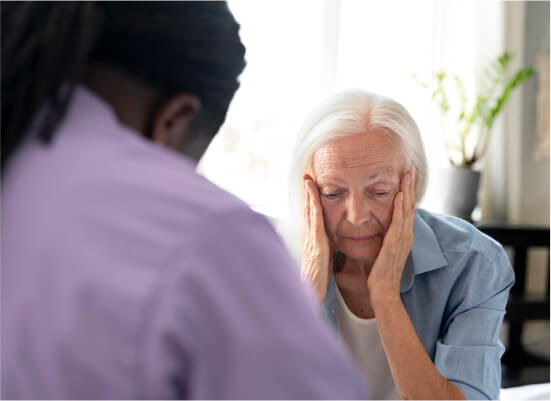As much as we’d like to believe that those caring for our elders are doing all they can to provide the highest level of care, that’s not always the case. Unfortunately, at least one in ten senior citizens experience some form of abuse—and experts believe that because abuse isn’t always reported, this number should be much higher.
Fortunately, there are things you can do if you suspect someone you love is being victimized. Keep reading to learn more about common signs of nursing abuse, and what you should do if you suspect neglect or misconduct.
Common Types of Elder Abuse
When our elderly and disabled loved ones need help with their most personal daily needs, we place a great amount of trust in their caregivers. Unfortunately, this trust is sometimes violated. The most common forms of elder and nursing home abuse include:
- Emotional abuse
- Physical abuse
- Neglect or abandonment
- Sexual abuse
- Financial abuse or exploitation
Sadly, individuals who experience elder abuse have a significantly higher risk of dying, and financial abuse results in an estimated $2.9 billion to $36.5 billion in annual losses.
RELATED ARTICLE: 3 Common Nursing Home Myths and Realities
How to Identify Signs of Elder Abuse
Because many nursing home residents will not report abuse, you should look for signs of abuse, advocate for your loved one’s safety, and gather evidence on their behalf. This is especially true if they have memory or cognitive deficits that make it difficult for them to express their wants and needs.
Signs an elder is experiencing abusive behavior include:
- Unusual bruising, especially around the wrists
- Broken bones or sprains that are out of the ordinary
- Bedsores, rashes, or wounds that won’t heal
- Increased anxiety around certain staff members
- Bruises, rashes, or other damage around their genitals or breasts
- Sexually-transmitted diseases (STDs)
- Lack of adequate food and water
- Dirty or unsafe living conditions
- Lack of access to their walker or wheelchair
- Lack of personal hygiene
- Personal items that disappear
- Broken glasses
- Hospitalizations
- Unexplained loss of funds
However, the use of restraints or other safety devices is not necessarily a sign of elder abuse. Under certain circumstances, nursing home residents should be restrained to protect them from harm.
RELATED ARTICLE: Steps to Take if You Suspect Nursing Home Abuse
Who is Liable in Nursing Home Abuse and Neglect Cases?
When the nursing staff at a long-term care center violates appropriate standards of care, the facility may be liable for their misconduct. However, determining liability in elder abuse cases can be complex — many elder care facilities contract with outside companies that provide goods or services to the facility. In these cases, you may have claims against multiple parties or companies.
RELATED ARTICLE: 5 Good Reasons to Sue a Nursing Home
Having an attorney who specializes in elder abuse is critical for protecting your loved ones and identifying the party that’s liable for the suffering they’ve experienced.
How to Report Elder or Nursing Home Abuse
If an elder is in immediate danger, call 911 right away. You can also report abuse to the proper authorities; the National Center on Elder Abuse has resources for potential victims and their families. You can also contact Oklahoma Adult Protective Services, a government agency that helps investigate abuse cases.
It would also be in your best interest to see a doctor or specialist outside of the nursing home where the suspected abuse took place to document their injuries and understand what happened in a safe environment. Finally, an experienced elder abuse lawyer can help you determine which agencies you need to contact and help you make those calls.
If you suspect that you or an elder you know have been the victim of nursing home abuse, you don’t have to suffer in silence. Our elders deserve to be protected and the those who caused their suffering should be held accountable.
AMA Law: Fighting for Nursing Home Abuse Victims
At AMA Law, we’re committed to the highest level of protection for our community’s elderly. We understand the devastating effect abuse can have on the victim and their family. If you believe an elder you love has been victimized by someone, don’t hesitate to reach out to us today. We’ll review your case for free, and provide compassionate, honest recommendations on how to proceed. To schedule your free, no-risk initial consultation with one of our attorneys, please call (405) 607-8757 or complete this brief form.
References
Elder abuse facts (n.d.). National Council on Aging. Retrieved from https://www.ncoa.org/public-policy-action/elder-justice/elder-abuse-facts/
The content provided here is for informational purposes only and should not be construed as legal advice on any subject.
